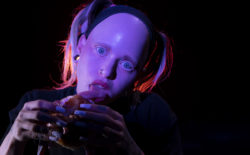Jerusalem’s foremost “psychotrap” outfit transform the writing of Michel Foucault, the philosophy of Deleuze & Guattari and the poetry of Antonin Artaud into cacophonous experimental hip-hop.
In Anti-Oedipus, the first volume of Gilles Deleuze and Felix Guattari’s monumental work Capitalism and Schizophrenia, the philosophers express their suspicion of Sigmund Freud’s theory of the Oedipal triangle with a quote from playwright and poet Antonin Artaud: “I don’t believe in father / in mother, / got no / papamummy.” These fractured lines provide the inspiration for the track and hallucinatory visual of the same name from Wackelkontakt, Jerusalem’s foremost “psychotrap” three-piece. Made up of MC Slice, aka Tomer Damsky, audiovisual artist Eyal Lally Bitton and producer Marco Milevski Tomasin, the trio have been collaborating on sound installations, multimedia performances and AV projects since 2018, operating at the vanguard of the experimental scene in Jerusalem.
The group’s singular sound and vision stems from their experiences of what they term “the boiling life on the border between East and West Jerusalem”, living a minute away from The Old City’s Damascus Gate and recording in the ultra-orthodox neighbourhood of Me’a She’arim, an environment that manifests in their work as “a sense of an absurd vitality, paranoia and isolation.” This same psychological pressure is the setting for the psychic exploration the group document in a pair of audiovisual adaptations to their tracks ‘Papamummy’ and ‘Progress’, the first of which opens their recent album, Heal The Split. Smashing together visceral psychodrama and esoteric and religious symbolism with immersive set design and staging, the videos function symbiotically with each other. If ‘Papamummy’ is the diagnosis, an anti-oedipal struggle presented as avant-garde theatre, then ‘Progress’ reflects the hopelessness of bending under such pressure: the panicked realisation of quite how much work you have left to do.
“In ‘Papamummy’ we played around with the idea of an ancient gift of false wisdom,” explain Wackelkontakt. “The lyrics are a mixture of broken fragments from The History of Sexuality by Michel Foucault, the schizo-philosophy of Deleuze and Guattari and the late poems of Antonin Artaud, which also inspired the story: The Not-Girl meets the entity of The Papamummy, a manifestation of her subconscious and her entire ancestry, who offers her the food of eternal knowledge. In an attempt to help herself she is eventually sucked further into madness. This idea of a split identity echoes the title of the album, the sense that what was breached and broken can never be put back together.”
The group continues: “the track ‘Progress’ is inspired by the moment you realise you face three possibilities: getting things together and trying to help yourself; pretending to be improving; or giving in to insanity. The pseudo-industrial beat and the samples of lapsing pitch remind us of the never-ending circle of improvement-deterioration while the human condition rolls down the stairs. The character in the song calls us over and over in protest until she is encaged in a loop inside her head, swallowed by a world of her own shrieks eventually turning into the cries of animals, the outside universe where her suffering has no meaning and her madness is of a ridiculous proportion.”



Food features heavily in the visuals of Heal The Split: MC Slice appears on the album’s cover emerging from a huge sheet of knafe, a Middle Eastern dessert, while a fish sandwich, itself a subversion of the Christian symbolism of loaves and fish, dissolves into pink goo in ‘Papamummy’ and falls from heaven in the style of a stereotypical hamburger commercial in ‘Progress’. “We love the notion of food as a mediator between the inside and the outside of the body,” explain the group. “The face immersed in knafe reflects the ambiguity that lies around questions of the right to use local symbols. Jerusalem is soaked in the phenomena of patronising exoticism, which we recognise all around, including in ourselves, and we feel like this is the default here and there’s no escaping it.”
‘Papamummy’ concludes with a filmic coda that seems to reflect this neurotic sense of paranoia. Breaking the fourth wall and leaving the stage upon which the track’s psychodrama plays out, MC Slice rushes to a supermarket, pacing through the aisles surrounded by food. While riding an elevator out of the supermarket, she is embroiled in a Lynchian confrontation, first smiling, then scowling at another woman’s gaze. “Time is love,” the woman says, “you put time in what you love.” This unsolicited outburst of wisdom causes MC Slice to storm off, the knowledge she has gained from papamummy now thrown into question.



‘Papamummy’ is taken from Heal The Split, which is out now on Màgia Roja. ‘Progress’ will be included in a forthcoming compilations on Raash Records. You can find Wackelkontakt on Bandcamp and Instagram.
‘Papamummy’ Credits
Written and directed by Wackelkontakt
Starring Tomer Damsky as MC Slice & Nir Vidan as The Papamummy
Guest Appearance by Dana Tkatch
Director of Photography, Editor, Visual Effects: Eyal Lally Bitton
Set Designer, Propmaker and Gaffer: Marco Daniel Milevski Tomasin
Makeup Artist: Adi Kahana
Performance Director: Nir Shauloff
Credits PROGRESS
Written and directed by Wackelkontakt
Performers: Tomer Damsky, Nir Vidan, Sveta
Director of Photography, Editor, Visual Effects: Eyal Lally Bitton
Art and Set Design: Marco Milevski Tomasin, Dana Tkatch, Tomer Damsky
Watch next: VRBA soundtracks Adrienne Cassel’s CGI mutations in ‘intuit’




































